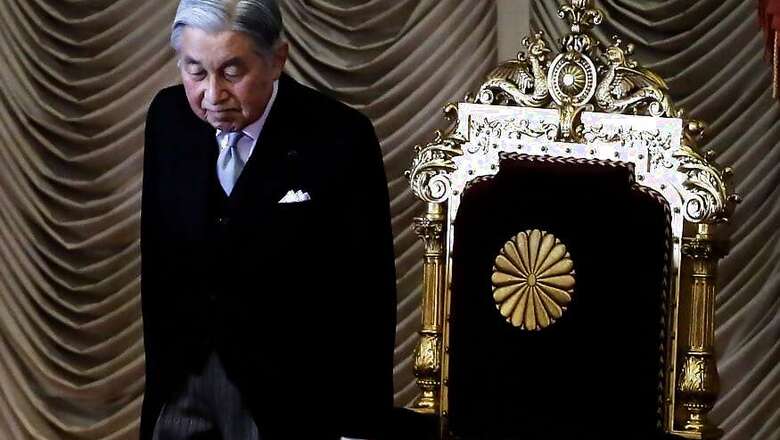
views
Tokyo: The Japanese government on Friday approved a one-off bill allowing ageing Emperor Akihito to step down from the Chrysanthemum Throne, in the first such abdication in two centuries.
Abdication must take place within three years of the bill becoming law.
Reports of his desire to retire surprised Japan when they emerged last July.
In August he publicly cited age and declining health, which was interpreted as his wish to hand the crown to his eldest son.
The status of the emperor is highly sensitive in Japan given its 20th century history of war waged in the name of Akihito's father Hirohito, who died in 1989.
Revered as a demigod before and during the conflict, Hirohito was reduced to a mere figurehead as part of postwar reforms.
Akihito has won plaudits for seizing upon the constitutionally-prescribed role of national symbol and there is wide sympathy for his wish to retire.
While a majority of the Japanese public supports a permanent law on abdication, they have also expressed support for the current bill for the sake of realising Akihito's smooth transition from the throne.
- 'Real danger' -
While abdications are far from unknown in Japanese history, the last one was in 1817.
Some scholars and politicians have argued that changing the law to allow any emperor to abdicate would risk Japan's monarchs becoming subject to political manipulation.
The issue has also highlighted concerns over a potential succession crisis in one of the world's oldest monarchies.
Only men are allowed to become emperor under current law, though Japan has had empresses in past centuries.
Female members of the imperial family must give up their royal status when marrying a commoner, underscored by news this week that one of Akihito's granddaughters plans to marry her college sweetheart.
But after that there are no more eligible males, meaning the centuries-old succession would be broken if Hisahito fails to have a son in the future.
Many Japanese believe the sustainability of the throne can be solved by allowing for female succession, but traditionalists vehemently oppose the idea.
Underscoring the urgency of the situation, a government panel tasked with making recommendations on the abdication issue said late last month in its final report that addressing the succession crisis cannot wait.




















Comments
0 comment